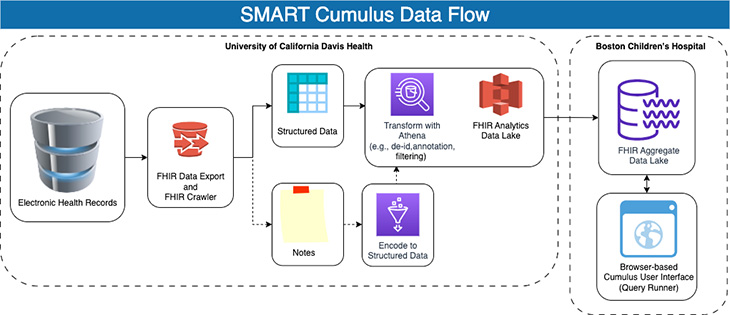Digital pilot program provides opioid overdose surveillance for local counties
SMART Cumulus project allows for easy, fast data exchange between health care and public health sites
UC Davis Health has partnered with the CDC Foundation and the Boston Children's Hospital on a pilot program called SMART Cumulus. The digital platform allows health care and research institutions to more easily exchange data with public health sites, allowing them to share the disease burden.
"Embracing interoperable open API tools ensures the future of health care is anchored in real-time, privacy-focused data exchange, propelling multi-institutional collaborations and sharper decision-making for the greater good," explained Yauheni Solad, chief medical information officer for digital health and UC Davis Health lead for the SMART Cumulus project.
For the first application of the program, the organizations have created an opioid overdose surveillance dashboard for Sacramento County Public Health and the Yolo County Health and Human Services Agency. The dashboard will allow public health officials to track opioid overdoses across the counties.
“Electronic health records are a rich source of information with a lot of significant, real world data,” said Prabhu RV Shankar, assistant adjunct professor of health informatics and informatics lead for the SMART Cumulus project for UC Davis Health. “With this new program, our researchers and public health officials will have access to data in a timely manner which helps them plan and improve the health of our communities.”
What is Cumulus?
To address the need for sharing large datasets across institutions, the program enables streaming of data formats in a secure privacy-preserving environment for faster execution of multi-site studies for population health initiatives. UC Davis Health’s Digital CoLab, the digital health innovation hub, partnered with the CDC Foundation and Boston Children's Hospital on the SMART Cumulus project, along with a few other major academic health care institutions across the nation.
With this new program, our researchers and public health officials will have access to data in a timely manner which helps them plan and improve the health of our communities.” —Prabhu RV Shankar
The program leverages access to structured data as well as information derived from the free text of clinician notes within electronic health records. Then, clinical notes and patients’ longitudinal medical histories are analyzed using artificial intelligence (AI). To protect the privacy of patients, only aggregate numbers, such as number of patients, symptoms, signs, diagnoses, medications, hospitalizations and other associated numbers for case definitions are shared outside of the health care institutions that care for the patients.
The SMART Cumulus program has the potential to benefit both public health and health care institutions by:
- Providing timely access to accurate, complete and standardized real world patient care data for public health surveillance and decision-making
- Reducing both health system and public health staff burden and costs for providing and using these data by standardizing pre-approved queries and providing data through a single data exchange pipeline
- Providing an opportunity to work together with health systems on creating and leveraging new data streams
“The current process of extracting and sharing data for research or public health is cumbersome and time consuming,” explained Sid Richardson, project manager for the SMART Cumulus project. “Researchers and public health officials need the data in the moment, not one year later when it will not be as useful.”
The public health partners will be able to view dashboards and perform analytics via a Cumulus web application. The data in the public health dashboard does not include any protected health information. It is populated only with aggregate, de-identified data.

Public health benefits
In late July, the SMART Cumulus program went live with its opioid overdose surveillance dashboard for Sacramento County Public Health and the Yolo County Health and Human Services Agency.
“When it comes to population health, public health officials are looking for data to determine trends and see where outbreaks could be occurring,” Shankar said. “If there is an outbreak of opioid overdoses and deaths due to contaminated opioids, public health officials need to be alerted so they can allocate resources and human services.”
Within the opioid overdose surveillance dashboard, public health officials will be able to sort through the data interactively and collect the information they need. This will allow them to make decisions about resource allocation to manage and prevent opioid overdoses at the community level.
“The United States is in the midst of an opioid overdose epidemic,” said Sacramento County Health Officer Olivia Kasirye. “The data and analytics we will be able to collect from the opioid overdose surveillance dashboard will help us to respond and address the health conditions of the communities that need it the most.”
In addition to opioid overdoses, other participating public health organizations are using the platform to track COVID-19, hypertension, mental health and diabetes.
21st Century Cures Act
One of the foundational pieces of the SMART Cumulus program is the 21st Century Cures Act. The federal law promotes interoperability and the free exchange of health information. It prevents health care providers and payers from blocking the fluid exchange of electronic health care records between organizations.
“The Cures Act is the cornerstone of the SMART Cumulus program because it reduces administrative burdens and makes it easier for data sharing among National Institutes of Health-supported research,” Richardson said. “Because of this program, we will not only be able to address the opioid crisis, but also focus on other health issues including research into serious illnesses and improving mental health services.”


